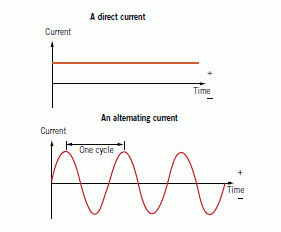Electricity Matters
The National Grid
In the UK the National Grid connects all the generators of electricity, like power stations, to all the users, for example homes and offices.
Mains electricity is an alternating current (a.c) which means that the current keeps changing direction. Current from batteries is direct current (d.c) meaning it always flows in the same direction.
Advantages of having a National Grid are:
- Power stations can be built where the fuel reserves are located for exampme by the sea for cooling.
- Pollution can be kept away from cities.
- Power can be diverted to where it is needed.
A disadvantage of the National Grid is that power is wasted heating the power lines.
Transformers
A transformer changes the size of an alternating voltage. Transformers will not work with a constant voltage. One of the reasons we have an a.c. mains supply is that the voltage is alternating and can be changed using transformers. This means it can be distributed more efficiently by using high voltages, for example 400 kV (1 kV = 1000 V). Step up and step down transformers are used to increase or decrease voltage.
The voltage is stepped up at the power station, transmitted at high voltage, to reduce power losses and stepped down at the local sub-station.

This video explains how Transformers work with changing currenst
Nuclear Power Stations
Nuclear power stations are like fossil fuel power stations, but instead of burning fuel they use nuclear fisson, to transfer energy as heat. The nuclear fuels used are uranium and plutonium. These substances are radioactive. Uranium is mined. Plutonium is formed in nuclear reactors. The disadvantage of nuclear power is that radioactive waste is produced as a by product. The material remains dangerous for millions of years.
The Nuclear Option
Advantages of nuclear power stations include:
- No carbon dioxide is formed in the nuclear reaction.
- A small amount of fuel releases a large amount of energy.
- The fuel is not expensive, so the running costs of nuclear power stations are not high.
Disadvantages include:
- There is the risk of an accidental emission of radioactive material while the power station is operating.
- Accidental emissions could happen due to human error, for example at Chernobyl in Ukraine, or to natural disasters, like earthquakes, for example at Fukushima in Japan.
- Both the power station and the fuel are targets for terrorists.
- The risks to living things from radioactive materials mean that there are high maintenance costs and high decommissioning costs. Radioactive waste must be stored safely for thousands of years.
- The cost of building and maintaining the plant is more expensive than for other power stations.
